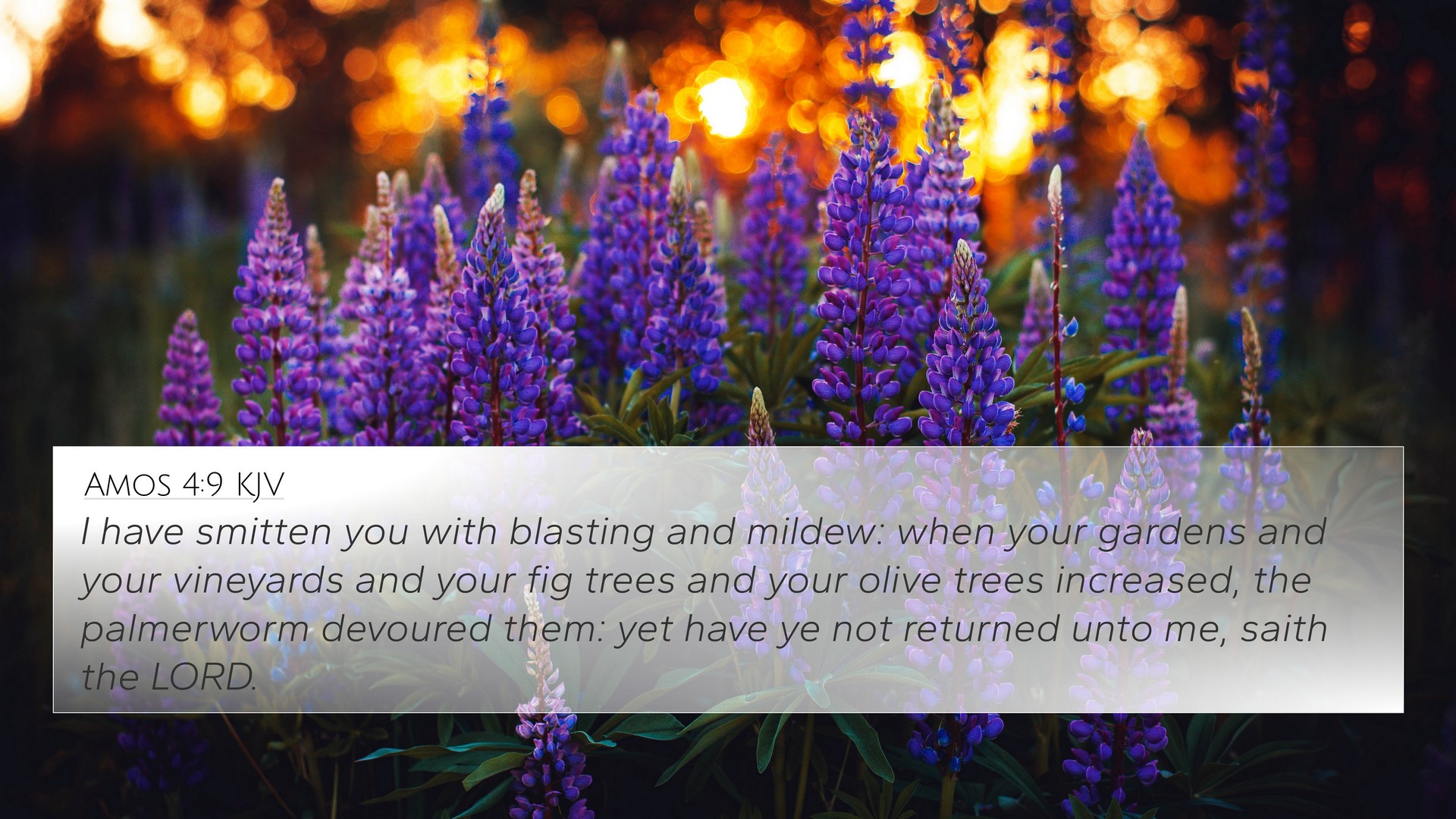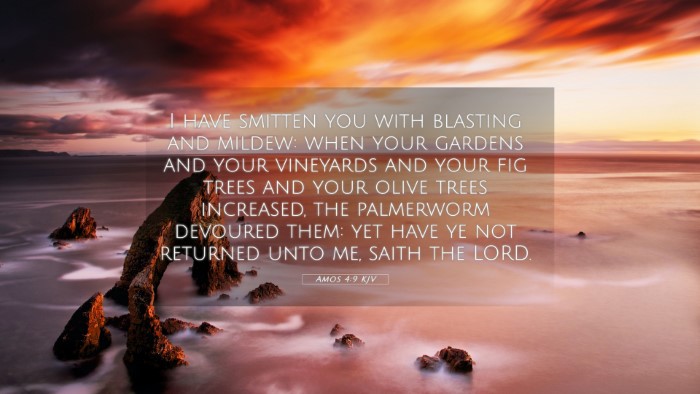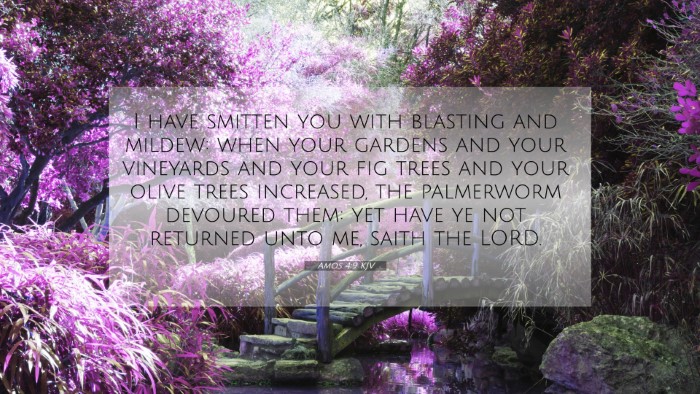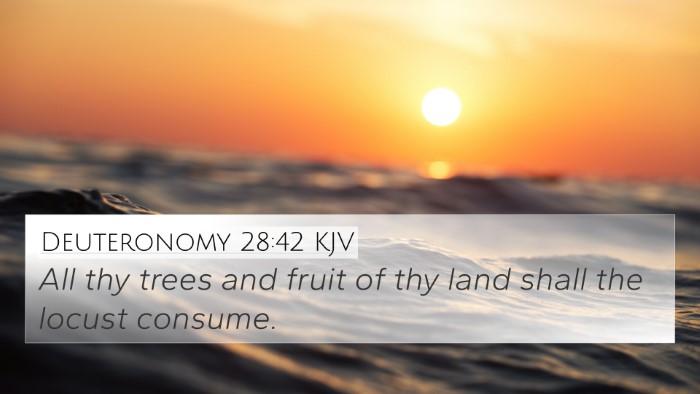Old Testament
Genesis Exodus Leviticus Numbers Deuteronomy Joshua Judges Ruth 1 Samuel 2 Samuel 1 Kings 2 Kings 1 Chronicles 2 Chronicles Ezra Nehemiah Esther Job Psalms Proverbs Ecclesiastes Song of Solomon Isaiah Jeremiah Lamentations Ezekiel Daniel Hosea Joel Amos Obadiah Jonah Micah Nahum Habakkuk Zephaniah Haggai Zechariah MalachiAmos 4:9 Similar Verses
Amos 4:9 Cross References
I have smitten you with blasting and mildew: when your gardens and your vineyards and your fig trees and your olive trees increased, the palmerworm devoured them: yet have ye not returned unto me, saith the LORD.
Uncover the Rich Themes and Topics of This Bible Verse
Listed below are the Bible themes associated with Amos 4:9. We invite you to explore each theme to gain deeper insights into the Scriptures.
Amos 4:9 Cross Reference Verses
This section features a detailed cross-reference designed to enrich your understanding of the Scriptures. Below, you will find carefully selected verses that echo the themes and teachings related to Amos 4:9 KJV. Click on any image to explore detailed analyses of related Bible verses and uncover deeper theological insights.

Haggai 2:17 (KJV) »
I smote you with blasting and with mildew and with hail in all the labours of your hands; yet ye turned not to me, saith the LORD.
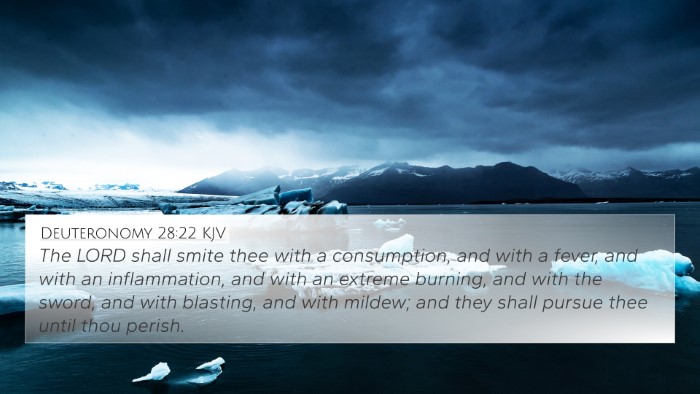
Deuteronomy 28:22 (KJV) »
The LORD shall smite thee with a consumption, and with a fever, and with an inflammation, and with an extreme burning, and with the sword, and with blasting, and with mildew; and they shall pursue thee until thou perish.
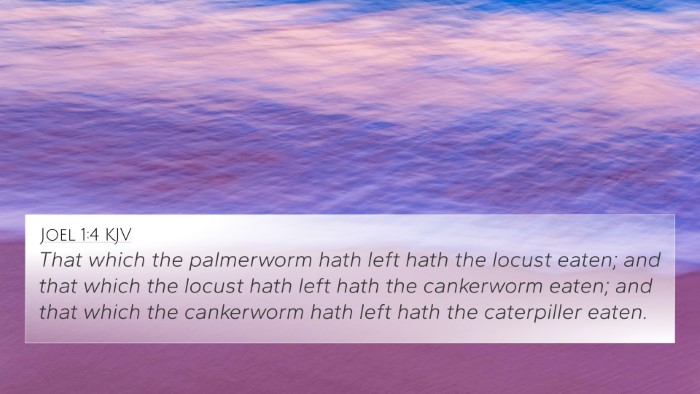
Joel 1:4 (KJV) »
That which the palmerworm hath left hath the locust eaten; and that which the locust hath left hath the cankerworm eaten; and that which the cankerworm hath left hath the caterpiller eaten.
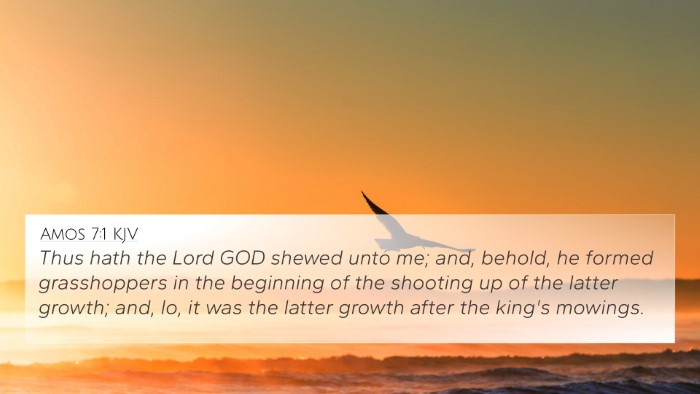
Amos 7:1 (KJV) »
Thus hath the Lord GOD shewed unto me; and, behold, he formed grasshoppers in the beginning of the shooting up of the latter growth; and, lo, it was the latter growth after the king's mowings.
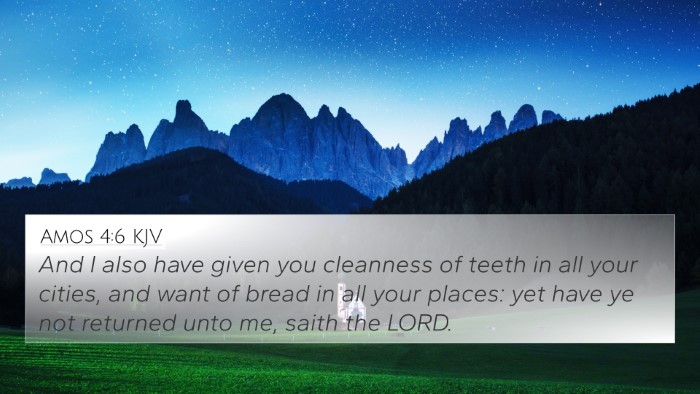
Amos 4:6 (KJV) »
And I also have given you cleanness of teeth in all your cities, and want of bread in all your places: yet have ye not returned unto me, saith the LORD.
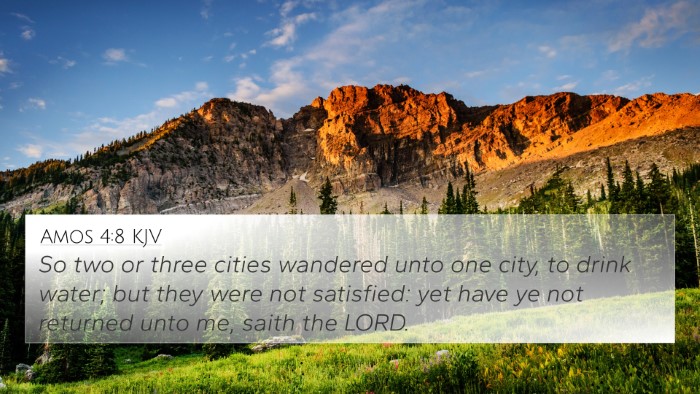
Amos 4:8 (KJV) »
So two or three cities wandered unto one city, to drink water; but they were not satisfied: yet have ye not returned unto me, saith the LORD.

Joel 2:25 (KJV) »
And I will restore to you the years that the locust hath eaten, the cankerworm, and the caterpiller, and the palmerworm, my great army which I sent among you.
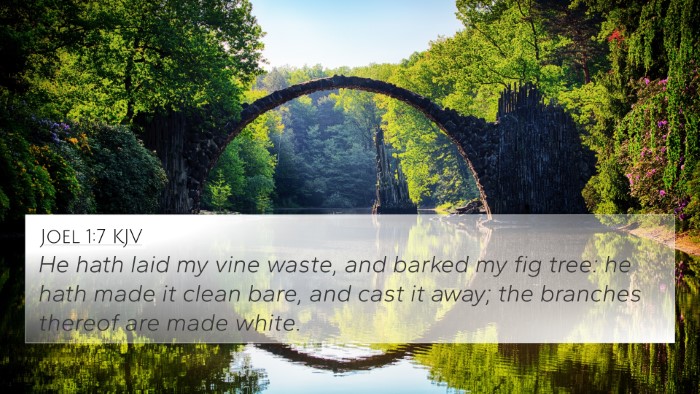
Joel 1:7 (KJV) »
He hath laid my vine waste, and barked my fig tree: he hath made it clean bare, and cast it away; the branches thereof are made white.
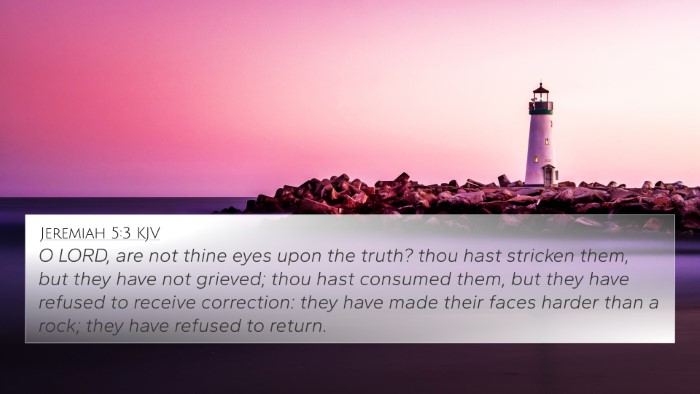
Jeremiah 5:3 (KJV) »
O LORD, are not thine eyes upon the truth? thou hast stricken them, but they have not grieved; thou hast consumed them, but they have refused to receive correction: they have made their faces harder than a rock; they have refused to return.
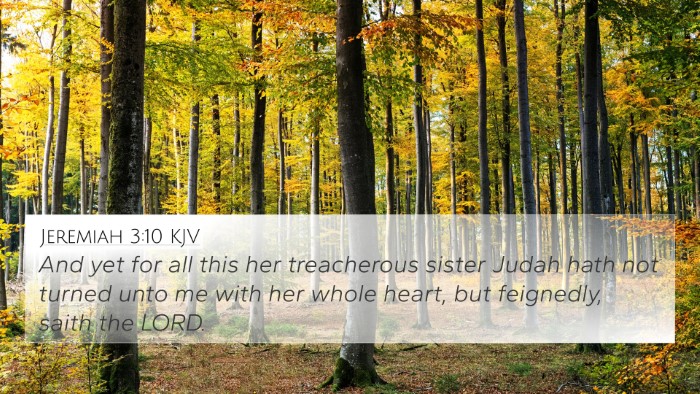
Jeremiah 3:10 (KJV) »
And yet for all this her treacherous sister Judah hath not turned unto me with her whole heart, but feignedly, saith the LORD.
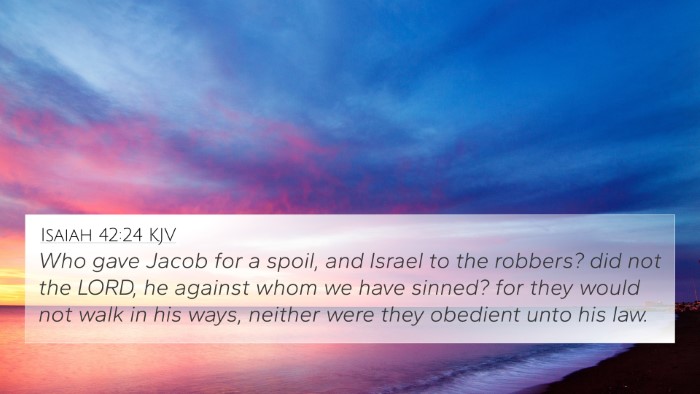
Isaiah 42:24 (KJV) »
Who gave Jacob for a spoil, and Israel to the robbers? did not the LORD, he against whom we have sinned? for they would not walk in his ways, neither were they obedient unto his law.
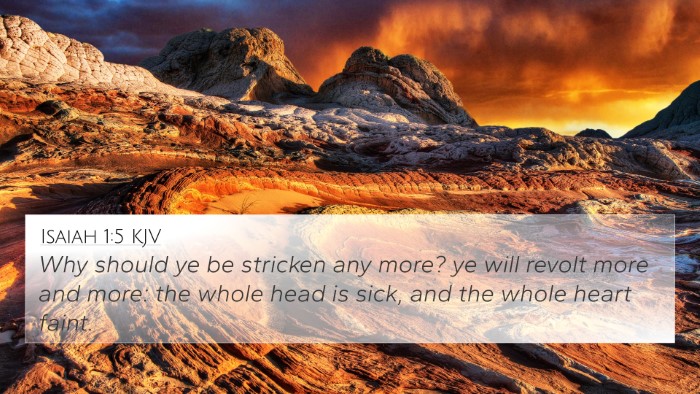
Isaiah 1:5 (KJV) »
Why should ye be stricken any more? ye will revolt more and more: the whole head is sick, and the whole heart faint.
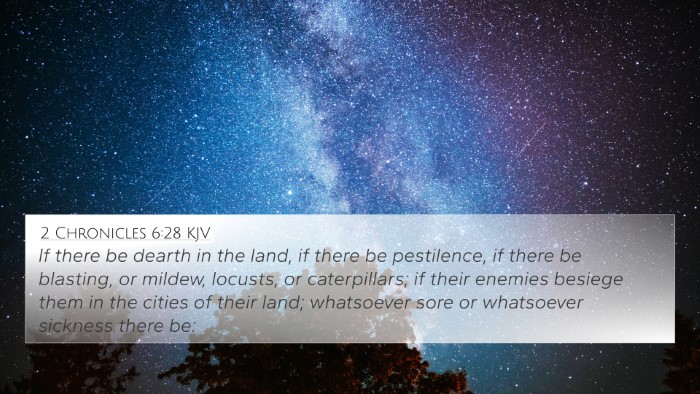
2 Chronicles 6:28 (KJV) »
If there be dearth in the land, if there be pestilence, if there be blasting, or mildew, locusts, or caterpillars; if their enemies besiege them in the cities of their land; whatsoever sore or whatsoever sickness there be:
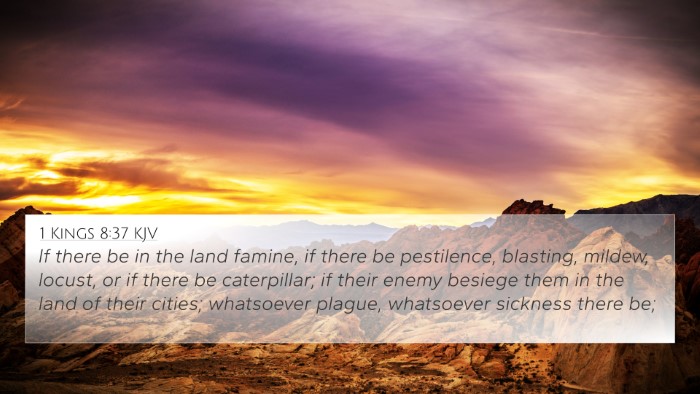
1 Kings 8:37 (KJV) »
If there be in the land famine, if there be pestilence, blasting, mildew, locust, or if there be caterpillar; if their enemy besiege them in the land of their cities; whatsoever plague, whatsoever sickness there be;
Amos 4:9 Verse Analysis and Similar Verses
Amos 4:9 - Understanding the Verse
Amos 4:9 reads: "I have smitten you with blasting and mildew: when your gardens and your vineyards and your fig trees and your olive trees increased, the palmerworm devoured them: yet have ye not returned unto me, saith the Lord."
Summary of Meanings
This verse delivers a poignant message about divine judgment and human responsibility. It illustrates how God has directly intervened in the natural world to bring about a sense of dependency and urgency for the Israelites to return to Him. The use of agricultural metaphors signifies blessings that have turned sour due to disobedience.
Insights from Commentaries
-
Matthew Henry:
Henry discusses how the Lord used natural calamities—blasting and mildew—to draw Israel to repentance. He emphasizes the idea that God often employs physical suffering to urge His people to reflect on their spiritual condition.
-
Albert Barnes:
Barnes highlights the severity of the devastation caused by the palmerworm, a metaphor for consuming judgment. He suggests that the reference to gardens and trees illustrates the loss of expected blessings due to unfaithfulness.
-
Adam Clarke:
Clarke focuses on the repeated call to return to God, noting that the calamities the people faced were intended to remind them of their need for divine intervention. He stresses that despite the misfortunes, the enduring mercy of God beckons the Israelites back.
Bible Cross-References
- Deuteronomy 28:15-18 - Lists the curses for disobedience, echoing the themes of judgment in Amos 4:9.
- Joel 1:4 - Illustrates the destruction caused by locusts, similar to the palmerworm in Amos.
- Haggai 1:6 - Discusses the futility of labor without God's blessing, reflecting Israel's struggle in Amos' time.
- Isaiah 1:4-6 - The call to repentance amidst divine warnings correlates with the message in Amos.
- John 15:2 - Jesus speaks of pruning to bear more fruit, linking to the blessings turned desolate in Amos 4:9.
- 1 Kings 8:37-40 - Solomon's prayer about drought and famine leading to repentance relates to Amos' warning.
- Zechariah 1:3 - The call to return to the Lord connects with the returning theme in Amos 4:9.
Thematic Connections
This verse encapsulates several themes crucial to understanding the prophetic literature:
-
Divine Judgment:
Both natural disasters and invasions are used as instruments of judgment against the unfaithful.
-
Call to Repentance:
Each calamity serves as a reminder for the people to turn back to God, emphasizing the need for active remorse and return.
-
God's Sovereignty:
The control over nature and its effects on the land showcases God's supreme authority and desire for His people.
Comparative Bible Verse Analysis
When conducting a comparative study involving Amos 4:9, it is vital to assess how different books convey similar themes. The above cross-references can provide valuable context, especially when using tools for Bible cross-referencing to deepen understanding. A thematic Bible verse connection links these messages across the Old and New Testaments, showcasing continuity in God's message to humanity.
Using Cross-References Effectively
The exercise of discovering cross-references enhances our Bible study. Here are tips for utilizing these references effectively:
- Identify repeated themes or phrases.
- Use a Bible concordance to find related verses.
- Consider the cultural and historical context behind each passage.
- Engage with varied translations for broader understanding.
Conclusion
In Amos 4:9, God articulates a profound truth: calamity serves not just as punishment but as a divine attempt to bring His people back into a loving relationship with Himself. This layered understanding deepens our spiritual readiness and awareness, reminding us that links between Bible verses guide us toward a more profound comprehension of God's relentless call to repentance.
